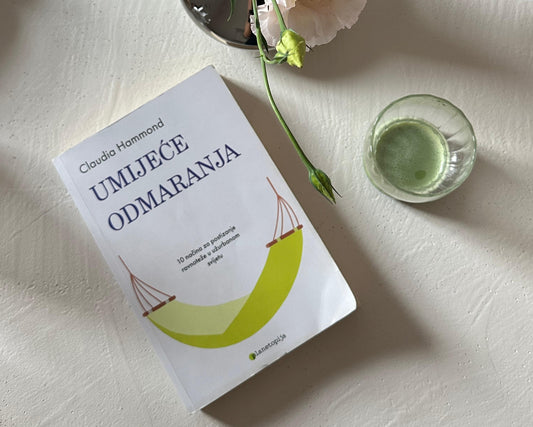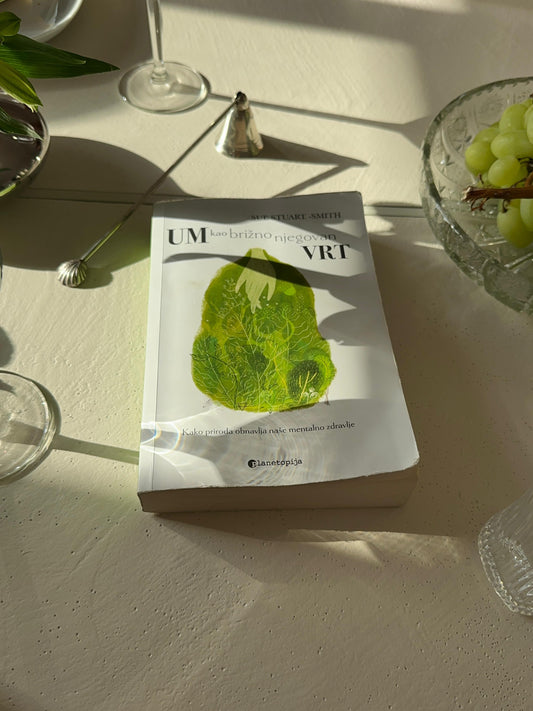The World Needs Happy People: The Art of Communicating by Thich Nhat Hanh
The December book in the Materia Book Club was Thich Nhat Hanh's "The Art of Communicating" -- a book that, despite its simplicity, left me with a question: do we really know how to talk, or do we just speak?
Today, we communicate more than ever before. Phones ring, emails arrive, messages pop up. We assume we are all very connected and always available. However, when we pause and think for a moment - the key question is not whether we are connected -- it's clear that we are -- but how deep that connection goes. How much do we really listen to each other?
When was the last time you listened to someone without already thinking of your response?
Thich Nhat Hanh reminds us of something we often forget: words are not just sounds we send into the world. Words are food. Just as we choose what to put into our bodies, we should carefully choose what we put into our thoughts, and what thoughts we offer to others. If words nourish, then it makes sense that some can heal, while others can poison.
But when was the last time you paid attention to what you put into your mind? What do you read, what do you listen to, who do you talk to? If we eat unhealthily, we will get sick. The same goes for words. If we take in toxic words, we become toxic. How often do we choose words like we choose fast food -- hastily, unconsciously, with a focus on instant gratification rather than long-term health?

The start of a conversation begins at home
Thich Nhat Hanh's most important message is that communication begins -- at home. And home is not just the walls and roof under which we live. Home is ourselves. Our mind, our body, our breath.
How often do we feel restlessness, anger, frustration, and have no idea where it comes from? We try to talk to others, but the words get stuck, turn into something painful. Thich writes that before we can talk to others, we must learn to talk to ourselves.
When we are agitated, he writes, we need to return to our home, that is, our "breath." Sit, breathe, and feel where we are. This simple act of returning to oneself -- which we forget because we are always in a rush -- is key to any communication.
"Conscious breathing helps us know what we feel," Thich writes. Simple, right? Just breathe. But how often do we breathe unconsciously, without really feeling each inhale? How often do we "not breathe" all day, until we feel that heavy stone on our chest?
Loneliness in a time of constant connection
One of the most poignant themes in the book is Thich's reflection on loneliness. We have never been more connected, but we have never been lonelier. Phones are always in our hands, the screen is always on, and notifications are constantly ringing.
Even as we dine with friends or have coffee with colleagues, we unconsciously reach for our phones, as if our real connection is happening on screens, not face to face. But, as Thich Nhat Hanh points out, the problem is not in the quantity of communication, but in its superficiality.
"Loneliness is the suffering of our time," Thich writes. These words resonate because it's clear how our interactions are often reduced to hasty responses and superficial reactions, without going deeper into what is really happening -- within ourselves and in the person across from us.
The result is a paradoxical emptiness: we are connected, but we feel disconnected. Technology promises intimacy, but delivers only the illusion.
Thich reminds us that the real cure for loneliness is not in another email, message, or liked post. The cure is in coming home. "Home is within us," he writes. If we are not present in our own body and mind, if we do not recognize our own feelings and needs, how can we truly be present for others?
Technology pulls us away from these moments of return -- moments when we can stop, breathe, and realize that we are here, that we are alive, and that we are enough.
But the return is not easy. The world pulls us outward, toward incessant doing, toward constantly searching for something or someone to fill the void. Thich offers us a simple but transformative tool: breathing. "Just breathe," he says. "Breathe and listen."
This simple act of conscious breathing creates space -- space in which loneliness can lose its power.
Deep listening: the art we have forgotten
One of the most important concepts in the book is deep listening. When Thich writes about listening, he's talking about something most of us don't practice -- listening without interrupting, judging, or waiting for a chance to say "yes, but..." and put ourselves and "I" in focus.
How to listen (to yourself and others)
The idea is simple: when we listen, we should listen with the intention to help the other person, without judging and without the need to react immediately.
"Listen with one goal," Thich writes, "to help the other person suffer less."
Imagine what conversations would look like if we listened this way. How often do we really listen, without already thinking about what we're going to say? How many times do we want to win the conversation, instead of truly hearing the other side?
Deep listening requires the courage to put the ego aside, to forget about "I" and "mine." It's an act of compassion, but also an act of presence -- to be there, in that moment, completely open.
It sounds simple, but in a world where every other sentence is a masked argument, deep listening becomes a revolutionary act.

The language of love
The language of love is not just sweet talk. It's honesty spoken with tenderness. Thich calls it "right speech," which is based on four rules:
- Speak the truth, but with love.
- Don't exaggerate.
- Be consistent. Don't say one thing to the person and another behind their back.
- Use peaceful language. Don't insult, attack, or judge.
We often forget that how we say something can be more important than the words themselves. We also often forget that even criticism can be expressed with respect.
The language of love is not about always being nice. It's about mindfulness. About choosing words that have a purpose, that don't create additional pain, that are -- simply -- kind. It's the power not to respond to an insult with an insult, to injustice with anger.
Because when you really ask yourself and pause for a moment - what do we gain by revenge? Does that feeling satisfy us or does it create an additional "hole", a "wound" in our body/stomach?
Six mantras for better relationships
Thich's mantras are like little anchors that bring us back to the present moment and enable deeper connections with others. Each of them seems simple, almost banal, but when applied in real life, they open the door to true transformation.
- "I am here for you." How often do we actually say this? Imagine the moment when someone, after a long day, looks you in the eye and says, "I am here for you." No distractions, no rush. Just presence. It could be your partner, child, or friend. Or yourself -- because this mantra is not just for others, but for ourselves as well.
When was the last time any of us said to ourselves: "I am here for you"?
- "I know you are there and I am happy about it." Thich reminds us how important it is not to take people for granted. Sometimes we are so focused on our own concerns that we don't see the small moments of closeness and connection. This mantra teaches us gratitude -- not for grand gestures, but for everyday presence. The partner who cooks dinner, the friend who asks how you are, the colleague who leaves you a cup of coffee on the table.
- "I know you are suffering and I am here for you." This mantra is especially powerful because it requires vulnerability from us. Sometimes, when someone is suffering, we don't know what to say, so we avoid that person or offer empty phrases. Thich teaches us that presence is often worth more than words. Sometimes it's enough to say, "I know it's hard for you. I'm here." Without the need to solve the problem, without the desire to say "everything will be alright." Just honest presence.
- "I'm suffering, please help me." How many times are we afraid to admit that we need help? The fear of rejection, of weakness, of exposure often drives us into isolation. Thich encourages us to approach others with trust and admit our own suffering.
This is not an act of weakness, but of courage -- because connection begins where the mask of independence ends.
- "This is a happy moment." How often do we forget to stop and recognize moments of happiness? This mantra brings us back to the present, to the small, fleeting moments of joy -- the first sip of coffee in the morning, the sound of a loved one's laughter, the smell of rain. Happiness doesn't come from great achievements, but from the ability to notice what we already have.
- "You are partially right." This mantra teaches us humility. In conversations, especially in conflicts, we often feel the need to be completely right. But Thich reminds us that truth has many sides. By acknowledging that the other person is partially right, we open up space for dialogue, for understanding, for connection.
These are not mystical phrases, but simple sentences that remind us of what is important.
Simple, but actually, all the members of the Materia Book Club agreed, so difficult to apply. These mantras ask us to forget the patterns of "anger" and "revenge", to rise above and go back to the beginning, when we only communicated as children those important sentences that radiate love. When that's all we needed to hear.
They teach us to be vulnerable, to admit our mistakes, and to appreciate the small moments of happiness. It sounds simple, but it's the simple things that are so often the hardest for us.

Communication as a cure for the world
In the end, Thich leads us back home -- not to a physical space, but to ourselves. His philosophy is not about escaping from the world, but about facing it from a place of inner peace.
In a world that constantly pushes us outward, toward more communication, more activity, more of everything, he calls us to silence.
"The world can take us anywhere, but only our own breath can bring us home," Thich writes.
Imagine a world in which words are not weapons, but light. A world in which we communicate from a place of kindness, not hurt. In which we listen not to respond, but to understand. This is not utopia; this is what Thich calls a return to ourselves.
Because in this world, more than ever, we need people who know how to stop, breathe, and say, "I am here." And perhaps more importantly, we need people who know how to say that to themselves.











